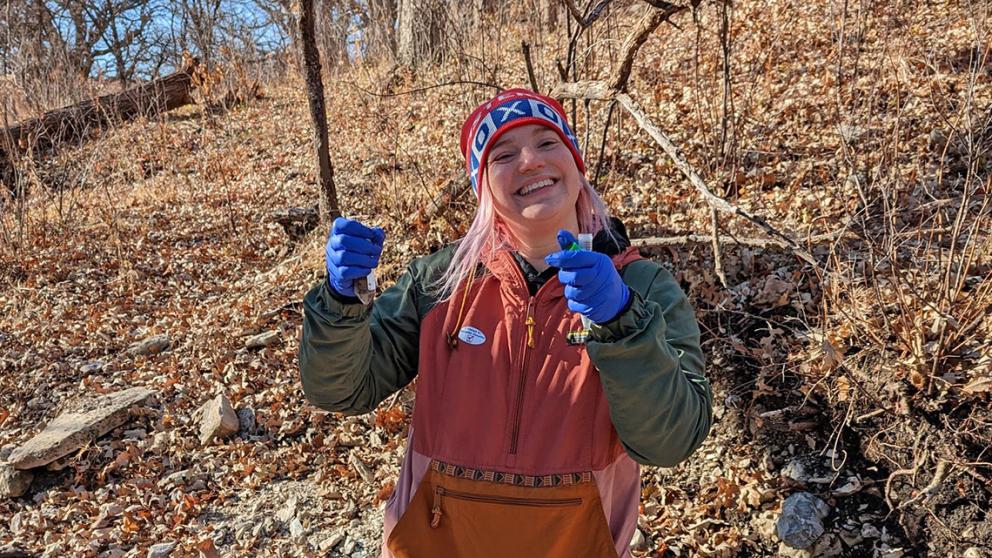News
More news
Featured Story
Seven students receive Kansas Biological Survey Student Research Awards for 2024
The Kansas Biological Survey & Center for Ecological Research at the University of Kansas has awarded $7,500 in funding this spring for student research to be conducted this year. Seven students will receive assistance through the research center’s 2024 Student Research Awards.

More news
Algae blooms are getting more toxic and spreading north on the Great Plains
States like North Dakota, South Dakota, Wyoming and Montana will have to deal with toxic blue-green algae blooms already common in Kansas. Utility companies will have to act fast to treat drinking water and keep it safe.
The ugly blue-green algae that frequently spoil Kansas lakes for swimming,…
Monarch Watch on The Weather Channel
How do monarchs find their way to Mexico, and what effect does weather have? Chip Taylor of Monarch Watch answers those questions and more.
KU research: Human-driven climate change to amplify risk of toxin concentration in U.S. lakes
Environmental and health regulators in Kansas routinely notify the public when lake concentrations of blue-green algae surged to levels that people and pets should avoid drinking or swimming in the water.
Warning advisories are in place for Lake Afton in Sedgwick County, Fossil Lake in Russell…
Research shows climate change boosts likelihood of toxin releases from algal blooms in American lakes
A broad analysis of lake water quality across the United States reveals human-driven climate change is increasing risks of high toxin concentrations from algal blooms in U.S. lakes, posing increasing hazards to people and wild and domestic animals, including dogs.
KU Field Station plans prescribed burn in Baldwin Woods next week
The University of Kansas Field Station has scheduled a prescribed burn of part of the Rice Woodland tract of the Baldwin Woods Forest Preserve for the week of October 23–27.
Scientists and volunteers work together to monitor annual butterfly migration
The annual monarch butterfly migration is well underway. The insects are due to arrive in Mexico just in time for the Day of the Dead in early November. For decades, scientists with the nonprofit group Monarch Watch have relied on thousands of volunteers to try and figure out the mysteries behind…
A spill near a Kansas nature reserve dumped oil and industrial salt water
About 10 barrels of oil and 1,500 barrels of industrial salt water spilled from an oil pipeline into a creek near the Quivira National Wildlife Refuge in central Kansas earlier this month. Rattlesnake Creek runs through the refuge, an important migratory stop for birds. The spill happened outside…
Week of events celebrates completion of walking labyrinth at KU Field Station
Several public events in early October will celebrate the completion of “here-ing,” an environmentally embedded artwork by Janine Antoni at the KU Field Station. A two-mile walking labyrinth, “here-ing” is shaped like the anatomy of the human ear that traverses a reseeded former cropland and…
Doctoral candidate in Billings Lab earns Fulbright
Micah Unruh, a doctoral candidate in ecology & evolutionary biology, is one of two KU doctoral candidates awarded the prestigious Fulbright-Hays Doctoral Dissertation Research Abroad Award. He received $41,000 to travel to Chile to research soil carbon storage. His advisor is Sharon Billings,…
Butterfly collapse spurs new investigation in Kansas
Monarch Watch founder Chip Taylor is interviewed in this Flatland KC story about a new study that he endorses.